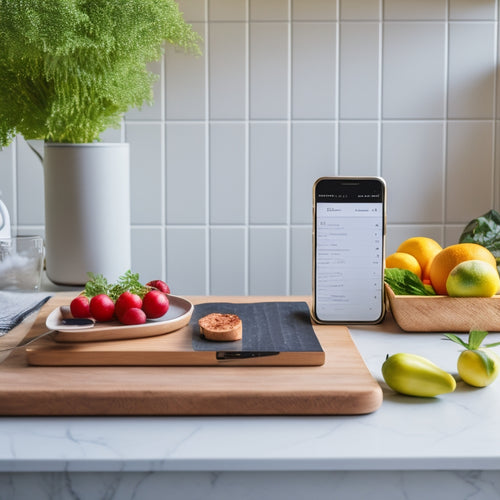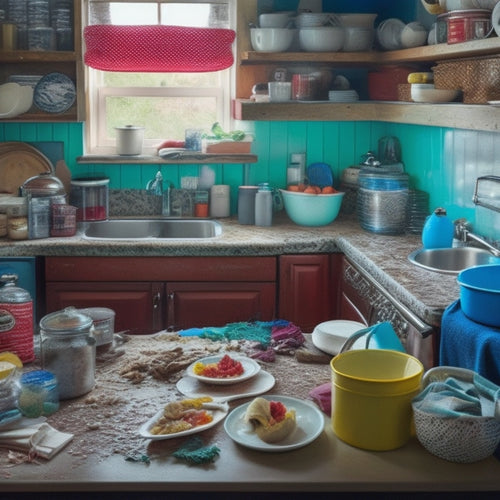
Mastering Commercial Kitchen Maintenance for Optimal Operation
Share
You oversee a seamless commercial kitchen operation when you prioritize proactive maintenance, which includes a detailed cleaning schedule, rigorous equipment upkeep, and a team trained to tackle these essential tasks. By implementing a professional cleaning checklist, you can guarantee consistency and accountability among staff. Effective maintenance also helps prevent operational disruptions, reduces costs, and upholds food safety standards. As you master commercial kitchen maintenance, you'll be able to optimize performance, reduce downtime, and increase customer satisfaction. Now, take the next step in refining your maintenance strategy to reap the full benefits of a well-run kitchen.
Key Takeaways
• Implement a personalized cleaning checklist to ensure consistent cleanliness and high hygiene standards in the commercial kitchen.
• Prioritize equipment maintenance through efficient cleaning techniques, routine checks, and preventive maintenance programs to extend equipment life.
• Train staff on proper cleaning procedures and delegate tasks effectively to optimize schedules and prevent operational disruptions.
• Integrate inspection protocols and regularly review maintenance schedules to ensure accountability and identify areas for improvement.
• Foster a culture of continuous improvement to prioritize cleanliness, optimize performance, and reduce downtime for optimal kitchen operation.
Importance of Commercial Kitchen Maintenance
Proper commercial kitchen maintenance is vital for guaranteeing the smooth operation of your kitchen. It directly impacts the safety, hygiene, and overall efficiency of your culinary operations. You understand that maintaining high hygiene standards is essential in preventing the spread of foodborne illnesses and securing customer satisfaction.
Regular maintenance also brings numerous benefits, including extended equipment life, reduced risk of cross-contamination, and enhanced efficiency. By prioritizing maintenance, you can prevent operational disruptions, reduce downtime, and save on operational costs.
Additionally, a well-maintained kitchen helps you uphold food safety standards, ensures compliance with regulations, and promotes a positive customer perception. By recognizing the importance of commercial kitchen maintenance, you can take the first step towards creating a kitchen that operates at its best.
Creating a Professional Cleaning Checklist
Establishing a personalized cleaning list tailored to your kitchen's specific needs helps you stay on top of daily, weekly, and monthly tasks, guaranteeing a consistently clean and efficient operation. You'll want to take into account your kitchen's unique equipment organization and cleaning frequency to create a schedule that works for you.
Task delegation is also essential, so identify which team members will be responsible for each task and make sure they understand their roles. Inspection protocols should also be integrated into your list to ensure that tasks are being completed correctly.
Overcoming Maintenance Challenges
By implementing a professional cleaning checklist, you've taken a significant step towards maintaining a clean and efficient commercial kitchen, but you'll still face challenges that can derail your best-laid plans if not addressed.
One major hurdle is making sure your staff is adequately trained to tackle cleaning tasks efficiently. Invest in staff training to guarantee they understand the importance of maintenance and can complete tasks correctly.
Another challenge is time management - allocating sufficient time for cleaning tasks amidst a busy kitchen schedule. Prioritize tasks, delegate effectively, and optimize your cleaning schedule to make sure seamless execution.
Cost Savings Through Cleanliness
You can reap significant financial rewards by committing to a cleanliness regimen in your commercial kitchen, as a well-maintained space leads to substantial cost savings over time. By prioritizing cleanliness, you'll enjoy numerous benefits that directly impact your bottom line.
Here are just a few ways cleanliness benefits your kitchen:
-
Reduced risk of cross-contamination and foodborne illnesses, resulting in fewer costly repairs and replacements
-
Extended lifespan of expensive kitchen equipment, delaying the need for expensive upgrades
-
Improved operational efficiency, leading to lower utility bills and reduced waste
-
Enhanced customer satisfaction, driving repeat business and positive reviews
-
Decreased downtime and increased productivity, allowing your team to focus on what matters most – serving exceptional food and providing high-quality service
Essential Checklist Components
To make sure your commercial kitchen maintains its cleanliness and runs efficiently, it's vital to integrate specific tasks into your daily, weekly, and monthly cleaning schedules. By doing so, you'll make certain that routine tasks are completed consistently, reducing the risk of cross-contamination and equipment breakdowns.
Your maintenance schedule should include tasks such as sanitizing high-touch areas, cleaning appliances, and inspecting equipment. Assign tasks to specific staff members to promote accountability and teamwork. Regularly review and update your schedule to make sure it remains effective and efficient.
A well-organized maintenance schedule will help you stay on top of tasks, saving you time and money in the long run. By prioritizing these crucial checklist components, you'll be well on your way to achieving top-notch kitchen operation.
Equipment Maintenance Best Practices
What distinguishes exceptional commercial kitchens from the rest is their dedication to implementing equipment maintenance best practices that guarantee appliances operate at peak performance, reducing downtime and maximizing productivity. By prioritizing efficient cleaning techniques and adhering to maintenance schedules, you can ensure your equipment operates at its best levels.
Here are some essential best practices to follow:
-
Develop a routine for daily, weekly, and monthly equipment checks to identify potential issues before they become major problems.
-
Train staff on proper cleaning procedures and provide them with the necessary tools and resources.
-
Implement a preventive maintenance program to address wear and tear on equipment.
-
Conduct regular audits to ensure compliance with maintenance schedules and identify areas for improvement.
-
Keep accurate records of maintenance activities to track progress and plan for future maintenance needs.
Ensuring Optimal Kitchen Operation
Six key elements must come together to ensure peak kitchen operation: a well-maintained facility, efficient workflows, skilled staff, effective inventory management, stringent sanitation practices, and a culture of continuous improvement.
You must prioritize these elements to guarantee your kitchen runs like a well-oiled machine. An efficient workflow is essential, as it allows you to manage tasks seamlessly and maximize productivity.
Establishing high cleanliness standards is also crucial, as it prevents cross-contamination and maintains a safe environment for food preparation.
By focusing on these key areas, you'll be able to optimize your kitchen's performance, reduce downtime, and increase customer satisfaction.
Frequently Asked Questions
How Often Should I Replace Kitchen Cleaning Supplies to Maintain Effectiveness?
You should replace kitchen cleaning supplies regularly, ideally every 1-3 months, to maintain their effectiveness, ensuring best cleaning results; consider implementing a cleaning supply rotation schedule to stay on track.
Can a Single Staff Member Be Responsible for All Kitchen Maintenance Tasks?
Can one person handle all kitchen maintenance tasks? It's a tall order, but with staff delegation, a well-structured maintenance schedule, and task prioritization, you can achieve it, fostering team collaboration and a seamless kitchen operation.
Are There Any Specific Cleaning Products Recommended for Commercial Kitchen Use?
When selecting cleaning products for your commercial kitchen, you'll want to choose ones that are effective against grease, grime, and bacteria, ensuring proper equipment maintenance and prolonging appliance lifespan, while also meeting food safety standards.
How Do I Handle Maintenance Tasks During Peak Kitchen Operation Hours?
During peak kitchen hours, you'll want to delegate tasks efficiently, prioritize equipment maintenance, and optimize workflow by assigning specific duties, managing your time effectively, and streamlining tasks to minimize disruptions.
Are There Any Government Regulations Governing Commercial Kitchen Maintenance Standards?
As you navigate the high-stakes world of commercial kitchens, you're wise to wonder about government regulations governing maintenance standards. Yes, you must comply with FDA's Food Code, OSHA's safety standards, and local health codes to avoid penalties and guarantee a safe, hygienic environment.
Related Posts
-

Simplify Meal Planning With These 5 Essential Apps
You're tired of last-minute takeout and wasted groceries, and you're not alone. Simplify meal planning with these 5 e...
-
What's Holding You Back From Reaching Your Diet Goals?
You're struggling to reach your diet goals, and it's not because you're not trying hard enough. It's likely due to co...
-

What's Holding You Back From a Clutter-Free Kitchen?
You're struggling to achieve a clutter-free kitchen because one or more of eight common obstacles are standing in you...

